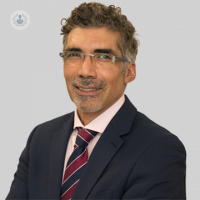Ways to prevent back pain: osteoporosis and your spine
Written in association with:Osteoporosis is a common condition affecting an estimated 3 million people across the UK. Osteoporosis happens when bones gradually become more fragile, progressing silently until a bone breaks. A fracture is usually the first sign of the disease being present, with fractures most common in the hip, wrist, and spine.

While osteoporosis usually displays no symptoms, one thing that sufferers may notice is the appearance of back pain. In those with osteoporosis or those who have low bone density, back pain is most commonly caused by fractures experienced in the lower back or spine. As bone weakens and loses density over time, the more likely a vertebral fracture becomes.
Patients with osteoporosis can present with a vertebral fracture after even everyday things such as quickly bending down, lifting an object, or by sneezing. Pain from vertebral fractures, and the subsequent muscle pain it triggers, are commonly found in those with osteoporosis.
Ways to prevent back pain
Preventing back pain is no easy task, but you can help to reduce your risk by following some of these tips:
- Be active and exercise. By doing exercise you can help to keep your back strong. Try to exercise for 30 minutes a day if you can, but the NHS recommend doing at least 150 minutes of moderate aerobic activity a week.
- As part of your exercise routine, try to include strength exercises, back exercises and stretches. If you are unsure about the right type of exercise for you, ask your GP, or a physiotherapist.
- Make sure that you lift objects correctly. When lifting incorrectly or too quickly, damage and stress can be done to the back. Make sure you are stable, that you have the right hold, and keep the object close to your waist. Don’t bend your back, and squat to lift rather than bending down.
- If you work in an office or similar environment and spend a lot of time in the day sitting down, try to get up every so often and take small breaks. The same goes for long periods of sitting while travelling, such as when driving, or on a plane journey. Get up every so often, or stop the car and have a rest.
- If you are overweight, try to lose weight and keep healthy through exercise and diet, as being overweight can contribute to the risk of developing back pain.
- Your sleeping habits are also important – certain positions can contribute to back pain as they put more pressure on your shoulders, neck, hips, and lower back. Having the right mattress and pillow is also important – make sure your mattress provides you with the right support.
- Equally, posture while awake is something to consider. While watching TV, or on the computer, be aware of your posture and try to support your back. Certain tips which can help include resting your feet on the floor, making sure you have the correct kind of chair, and if working at a computer, make sure your screen is at eye level. Of course, if you are sitting for long periods of time, make sure to change position when you can. Short breaks from time to time are much better than one long break in the middle of the day.
It is important that you visit your healthcare provider if you have experienced a fracture, or if you are worried about osteoporosis and back pain, as they can help to advise on the best course of treatment and prevention, if necessary. Many vertebral fractures are not treated appropriately, meaning the problem can get worse and become more serious.



